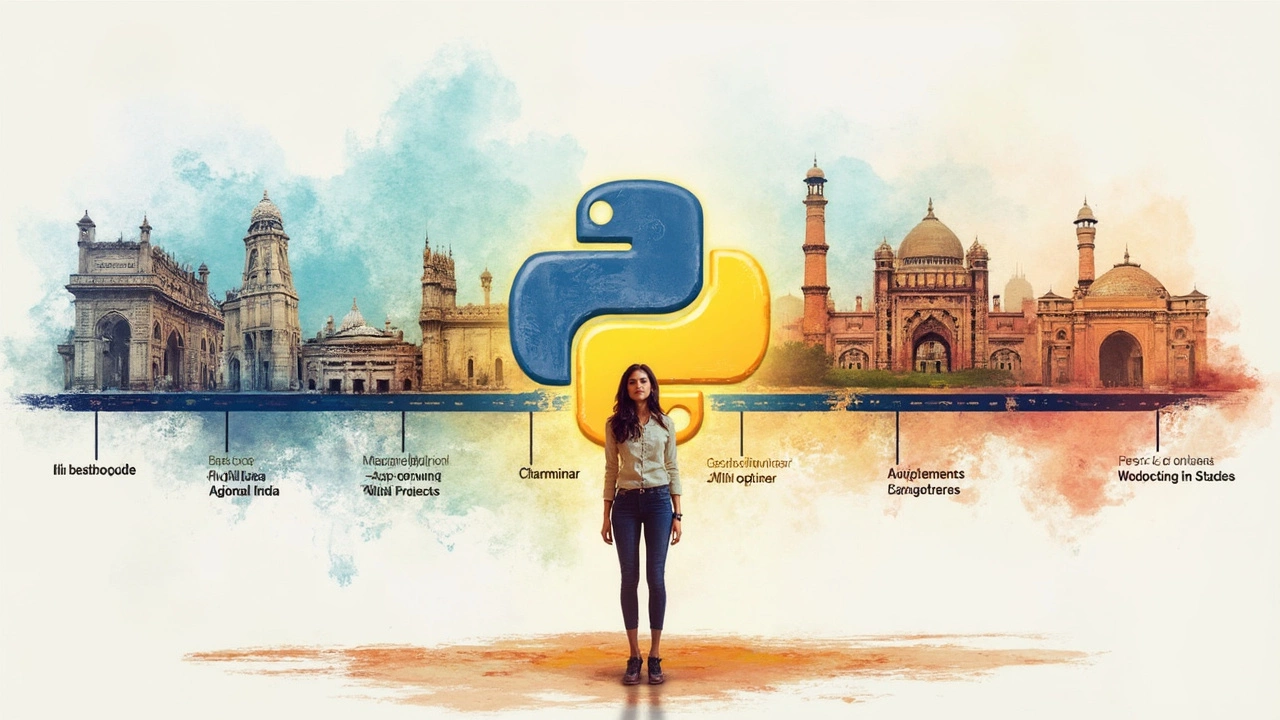
How Long Does It Take to Learn Python? Your Realistic Timeline
People always ask, "How fast can I learn Python?" The truth is, it totally depends on what you want to do with it. If you only need Python for some quick scripts, you might get the basics down in a few weeks. Want to build apps or dive into machine learning? That's going to take longer, and you'll need to stick with it.
There's a common trap: thinking you can 'finish' learning Python in 30 days just by watching videos. It doesn't work like that. Coding, like playing guitar or learning a sport, needs actual practice. Most people can get the basics in around 6-8 weeks if they're putting in a few solid hours a week. If you can give it an hour or two most days, you'll see real progress without burning out.
Here's the cool part: Python is super beginner-friendly. There's less weird stuff to memorize compared to languages like C++ or Java. The syntax (the way you write code) is pretty close to plain English. That means you can actually write simple programs, even if you've never coded before.
- The First Steps: Getting Comfortable
- How Much Time Should You Really Expect?
- What Matters More Than Hours: Practice and Consistency
- Staying Motivated and Avoiding Burnout
- Milestones: When Can You Call Yourself a Python Developer?
The First Steps: Getting Comfortable
The idea of learning your first programming language can feel a bit overwhelming, but getting started with learn Python is actually one of the easiest ways in. That’s why a lot of schools and even big tech companies—like Google—recommend it as a beginner’s first language. Python’s popularity shot up by 27% between 2018 and 2023, according to the TIOBE Index, because it’s simple to read and use.
First thing you need? A place to write code. Most folks use free tools like IDLE (which comes with Python), or download something friendlier like VS Code. If you want zero setup, websites like repl.it let you run Python in your browser, no installations needed.
Your very first goal is to learn what Python ‘feels’ like. Don’t stress about doing big projects. Focus on:
- Installing Python and picking a code editor (IDLE, VS Code, or even an online platform).
- Running your first program (the classic:
print('Hello, world!')). - Learning how to use variables, basic data types (numbers, strings), and simple math operations.
- Figuring out how to fix simple errors—because yes, you’ll make typos. Everyone does.
It helps to use simple resources that focus on practical coding, not just theory. The official Python docs are solid, but platforms like Codecademy or freeCodeCamp have interactive tutorials for beginners. Mixing up video lessons and hands-on practice usually works best—your brain gets to see then do.
Here’s a look at what beginners usually cover in the first two weeks:
| Topic | Average Time to Grasp | Key Skill |
|---|---|---|
| Installing Python | 30 minutes | Running scripts locally |
| Basic Syntax & Print | 1 hour | Printing output, comments |
| Variables & Types | 2 hours | Using numbers, strings, booleans |
| Operators | 1 hour | Doing math, basic comparisons |
Take it step by step. Write a little bit of code each day—even if it’s just 15 minutes. You’ll be surprised how quickly stuff starts to stick when you see your code running on the screen. And remember, nobody nails everything at once. The point is to gain confidence using Python, not to rush through it.
How Much Time Should You Really Expect?
If you’re here for a straight answer, learning Python depends on your starting point and your goals. Let’s break it down so you can see where you might fit in.
- Total beginner? If you’ve never touched code, you’ll likely need around 8-10 weeks to be comfortable with the essentials—if you put in 5-7 hours a week. That’s enough to write simple programs, understand the basics, and Google your way out of trouble.
- Programming background? If you already know another language, picking up Python can take as little as 2-4 weeks, because you only need to learn the syntax and some quirks.
Here’s a quick breakdown people often use for their own timelines:
| Level | Hours/Week | Estimated Time | Skills You Gain |
|---|---|---|---|
| Beginner (no coding) | 5-7 | 8-10 weeks | Basic syntax, simple scripts |
| Some coding | 4-6 | 3-5 weeks | Confident usage, small apps |
| Daily practice (intense) | 15+ | 2-3 weeks | Fast ramp-up (but easy to burn out) |
The most important part: it doesn’t matter how quickly you finish a course or tutorial. What matters is how often you practice. A Harvard study found that students who practiced short coding tasks daily learned twice as fast as those who crammed all their coding into weekend marathons.
If your goal is to get a job using Python, you should plan for a few extra months. You’ll need to learn more advanced stuff like using libraries, debugging, and working on bigger projects—not just the basics taught in beginner classes.
The best way to stay on track? Set small, regular goals. If you nail three simple scripts a week, you’ll feel yourself getting better much faster than grinding through one huge project and getting frustrated.
So, bottom line: stay consistent. Expect a few weeks to get comfy, and a few months to really get the hang of it if you’re after something bigger.

What Matters More Than Hours: Practice and Consistency
Way too often, people get caught up in counting how many hours they’ve spent learning Python. Sure, time matters, but how you use it matters way more. Pushing through three straight hours of tutorials doesn’t stick as well as doing something—anything—daily. It’s just like hitting the gym. Doing fewer, regular workouts trumps random, long sessions every time.
Here’s the thing: Your brain needs repetition to hold onto coding concepts. Research from the Radboud University (Netherlands, 2016) found that spreading out learning sessions—like 30 minutes a day, most days—helps people remember new skills longer compared to binging once a week.
Not all practice is equal, either. It’s easy to feel productive watching videos, but you only really learn when you type code and break stuff. Then, you troubleshoot. That’s when actual learning happens. Here are some ways to make every minute count:
- Set tiny daily goals, like finishing one short script or lesson.
- Mix it up: Try challenges, play around in a Python shell, or copy-paste code and fix errors intentionally.
- Don’t be afraid to build silly projects—a random password generator or a basic calculator teaches way more than just reading syntax.
- Use spaced repetition for concepts you struggle with. Free tools like Anki work well for remembering functions and methods.
Here’s a side-by-side comparison of two learners taking different approaches. Which one sounds better to you?
| Learning Plan | Hours/Week | Consistency | Skills After 2 Months |
|---|---|---|---|
| Binge 1 day/week | 5 | Low | Basic syntax, slow problem solving |
| 30 min, 5 days/week | 2.5 | High | Learn Python fundamentals, write simple programs, debug faster |
Don’t sweat hitting a strict number of hours. Focus on steady, measured practice, and Python will start making sense before you know it.
Staying Motivated and Avoiding Burnout
Most people hit a wall at some point while they're trying to learn Python. You start off excited, but once the newness dips, it can feel easy to quit. Here's what actually works to keep that beginner energy going and help you avoid that classic crash-and-burn effect.
Mix things up rather than repeating the same lessons over and over. Don’t just read or watch—actually type out code and break things on purpose sometimes. Tackling small real projects, like a budget tracker or guessing game, makes you see progress and gives your practice purpose. According to a 2023 Stack Overflow survey, learners who build mini projects stick with coding almost twice as long as those who just do tutorials.
Get social with your learning. Posting your questions and wins on forums like Reddit’s r/learnpython can really recharge your motivation. Don’t be shy about sharing what you’re stuck on. Most programmers love to help newbies (because they all remember being there, too).
Set short-term goals instead of focusing on “mastering” Python. For example, aim to finish a simple script by the weekend, or solve five challenges on LeetCode. Seeing these little wins adds up, and keeps you moving forward. And if you’re feeling fried, it’s okay to take a short break—burnout usually shows up after marathon study sessions, not after consistent daily practice.
- Keep coding sessions short—think 30-60 minutes, not all-night binges.
- Switch topics or try new challenges if you’re bored or stuck.
- Share your progress, even if it feels tiny.
- Remember, even professional developers Google things all the time—nobody remembers everything!
Learning Python takes time, but it shouldn’t feel like a grind. Focus on small steps, get support when you need it, and make coding part of your routine. That way, you can avoid burnout and actually enjoy seeing yourself improve.

Milestones: When Can You Call Yourself a Python Developer?
Figuring out when to actually call yourself a Python developer can feel like a weird line in the sand. Is it when you finish a course, build a project, or get paid for code? Truth is, tech doesn't come with badges or certificates you flash at people. But there are a few practical milestones that everyone hits along the way.
- Know the basics: You’re comfortable with variables, loops, functions, and using external libraries (like pandas or requests).
- Built something real: You’ve finished at least one small project from scratch. Think a calculator, a web scraper, or a basic web app.
- Debugging isn’t scary: You can hunt down and fix common errors without needing constant help.
- Use version control: Maybe you’ve pushed a project to GitHub.
- Read other people’s code: You can understand and tinker with decent-sized code snippets someone else wrote.
One stat that pops up a lot: according to Stack Overflow’s 2023 survey, over 48% of new Python learners said they felt comfortable enough to start job-hunting or freelancing within a year of focused practice. That’s not instant, but it’s way faster compared to something like C++ or Java.
| Milestone | Usual Timeframe |
|---|---|
| Basic scripting | 1-2 months |
| First real project | 2-4 months |
| Comfortable with errors/debugging | 3-6 months |
| Freelance-ready or junior job | 6-12 months |
It’s not only about writing code. A lot of companies want to see you can solve problems and explain your thinking, not just copy-paste code. Here’s a quote from Guido van Rossum, the guy who created Python:
“It’s not important how much you know. What matters is what you can figure out when you need to.”
Marking these milestones is way more useful than waiting for someone to give you permission. If you’ve ticked off most of these, you can absolutely call yourself a Python developer. The best way to get confident? Share your projects. Help out on forums. Don’t wait for perfect. Just start building and learning as you go. That’s what the pros do, too.






Write a comment